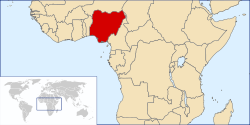Difference between revisions of "Yoruba identity in Nigeria"
| Line 1: | Line 1: | ||
| − | Colonial formation of local ethnicity: the case of the Yoruba | + | Colonial formation of local ethnicity: the case of the Yoruba in Nigeria |
| + | |||
| + | [[Image:250px-LocationNigeria.svg.png]] | ||
| Line 20: | Line 22: | ||
linked by shifting patterns of allegiance and competition...." | linked by shifting patterns of allegiance and competition...." | ||
| + | "The term Yariba or Yarba appears to have originated among the Hausa, | ||
| + | who applied it to their southern neighbors, the Oyo. By 1800 Muslim Hausa | ||
| + | clerics used this term to refer to the subjects of other kingdoms that had | ||
| + | fallen under the suzerainty of the Oyo Empire, ....The Oyo themselves had adopted the designation Yoruba as | ||
| + | a mode of self-reference by the early 19th century, a process probably | ||
| + | encouraged by the high status associations of Hausa regal culture and Islam." | ||
| + | ---- | ||
| − | + | Social internalization of external label imposed by more powerful culture: such a phenomenon is common since the "homogeneity" of an "ethnic group" is only "visible" from the outside. | |
| − | + | In this sense, the operation of "othering", when carried out from a position of superior power, is a primary source of identity. Yet such identities, once internalized, can also be maneuvered for new ends. | |
Revision as of 14:06, 25 September 2007
Colonial formation of local ethnicity: the case of the Yoruba in Nigeria
Waterman, p. 368-9:
"It appears that a good number of the societies represented in authoritative books about Africa...are at least in part the products of colonialism, which had to create its objects in order to control its subjects.'"
"There were no Yoruba-that is, no one who would have said "I am Yoruba"-before the early 19th century. As one writer has perhaps overzealously phrased the matter, "the word 'Yoruba' was nothing short of pure Greek to no less than 99% of the people now called Yorubas, when they first heard it being used for them as a common name". The peoples of southwestern Nigeria, the Benin Republic, and Togo who are today referred to by scholars as "the Yoruba" were, until the late 19th century, organized into a series of some 15 to 20 independent polities, linked by shifting patterns of allegiance and competition...."
"The term Yariba or Yarba appears to have originated among the Hausa, who applied it to their southern neighbors, the Oyo. By 1800 Muslim Hausa clerics used this term to refer to the subjects of other kingdoms that had fallen under the suzerainty of the Oyo Empire, ....The Oyo themselves had adopted the designation Yoruba as a mode of self-reference by the early 19th century, a process probably encouraged by the high status associations of Hausa regal culture and Islam."
Social internalization of external label imposed by more powerful culture: such a phenomenon is common since the "homogeneity" of an "ethnic group" is only "visible" from the outside.
In this sense, the operation of "othering", when carried out from a position of superior power, is a primary source of identity. Yet such identities, once internalized, can also be maneuvered for new ends.
